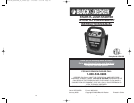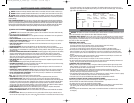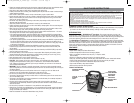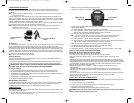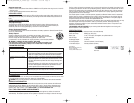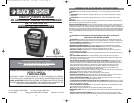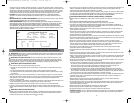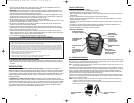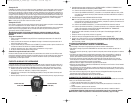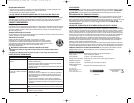
3
in line voltage resulting in loss of power and overheating. The following table shows the correct size to use
depending on cord length and nameplate ampere rating. If in doubt, use the next heavier gage. The smaller the
gage number, the heavier the cord.
IMPORTANT SAFETY INSTRUCTIONS
WARNING: This product or its power cord contains lead, a chemical known to the State of California to cause
cancer and birth defect or other reproductive harm. Wash hands after handling.
WARNING: BURST HAZARD: Do not use the unit for charging dry-cell batteries that are commonly used with
home appliances. These batteries may burst and cause injury to persons and damage property. Use the unit for
charging/boosting a LEAD-ACID battery only. It is not intended to supply power to a low-voltage electrical system
other than in a starter-motor application.
WARNING: SHOCK HAZARD:
• If an extension cord is used, make sure that:
a) the pins of extension cord are the same number, size and shape as those in the charger,
b) the extension cord is properly wired and in good electrical condition,
c) the wire size is large enough for the AC rating of the charger as indicated in the table on page 1.
• Do not operate unit with damaged cord or plug; or if the unit has received a sharp blow, been dropped, or
otherwise damaged in any way. Do not disassemble the unit; take it to a qualified service technician when
service or repair is required. Incorrect reassembly may result in a risk of electric shock or fire, and will void
warranty.
• Use of an attachment not supplied, recommended or sold by manufacturer specifically for use with this unit
may result in a risk of electrical shock and injury to persons.
• NEVER submerge this unit in water; do not expose it to rain, snow or use when wet.
• To reduce risk of electric shock, disconnect the unit from any power source before attempting maintenance or
cleaning. Turning off controls without disconnecting will not reduce this risk.
WARNING: RISK OF EXPLOSIVE GASES
• Working in the vicinity of a lead acid battery is dangerous. Batteries generate explosive gases during normal
battery operation. For this reason, it is of the utmost importance that each time before using the jump-starter
you read this manual and follow instructions exactly.
• To reduce the risk of battery explosion, follow these instructions and those published by the battery
manufacturer and manufacturer of any equipment you intend to use in the vicinity of the battery. Review
cautionary markings on these products and on the engine.
• This equipment employs parts (switches, relays, etc.) that produce arcs or sparks. Therefore, if used in a garage
or enclosed area, the unit MUST be placed not less than 18 inches above the floor.
• THIS UNIT IS NOT FOR USE BY CHILDREN AND SHOULD ONLY BE OPERATED BY ADULTS.
CAUTION: TO REDUCE THE RISK OF INJURY OR PROPERTY DAMAGE:
• Pull cord by plug rather than cord when disconnecting the 120V AC Charging Adapter from the unit.
• NEVER ATTEMPT TO JUMP-START OR CHARGE A FROZEN BATTERY.
• To recharge this unit, use only the supplied AC Charging Adapter.
• Vehicles that have on-board computerized systems may be damaged if vehicle battery is jump-started. Before
jump-starting, read the vehicle’s owner’s manual to confirm that external-starting assistance
is suitable.
• When working with lead acid batteries, always make sure immediate assistance is available in case of accident
or emergency.
Minimum Gage for Cord Sets
Volts Total Length of Cord in Feet
120V 0-25 26-50 51-100 101-150
(0-7,6m) (7,6-15,2m) (15,2-30,4m) (30,4-45,7m)
240V 0-50 51-100 101-200 201-300
(0-15,2m) (15,2-30,4m) (30,4-60,9m) (60,9-91,4m)
Ampere Rating
More Not more American Wire Gage
Than Than
0 - 6 18 16 16 14
6 -101816 14 12
10 -121616 14 12
12 - 16 14 12 Not Recommended
2
SAFETY GUIDELINES / DEFINITIONS
DANGER: Indicates an imminently hazardous situation which, if not avoided, will result in death or serious injury.
WARNING: Indicates a potentially hazardous situation which, if not avoided, could result in death or serious injury.
CAUTION: Indicates a potentially hazardous situation which, if not avoided, may result in minor or moderate injury.
CAUTION: Used without the safety alert symbol indicates potentially hazardous situation which, if not avoided, may result in
property damage.
RISK OF UNSAFE OPERATION. When using tools or equipment, basic safety precautions should always be followed to
reduce the risk of personal injury. Improper operation, maintenance or modification of tools or equipment could result in
serious injury and property damage. There are certain applications for which tools and equipment are designed. Black &
Decker strongly recommends that this product NOT be modified and/or used for any application other than for which it
was designed. Read and understand all warnings and operating instructions before using any tool or equipment.
GENERAL SAFETY WARNINGS AND INSTRUCTIONS FOR ALL APPLIANCES
READ ALL INSTRUCTIONS
WARNING: Read all instructions before operating product. Failure to follow all instructions listed below may
result in electric shock, fire and/or serious injury.
• AVOID DANGEROUS ENVIRONMENTS: Don’t use appliances in damp or wet locations. Don’t use appliances in
the rain or snow.
• KEEP CHILDREN AWAY. All visitors should be kept at a distance from work area.
• STORE IDLE APPLIANCES INDOORS. When not in use, appliances should be stored indoors in dry, and high or
locked-up place – out of reach of children.
• DON’T FORCE APPLIANCE. It will do the job better and with less likelihood of a risk of injury at the rate for
which it was designed.
• USE RIGHT APPLIANCE. Do not use the appliance for any job except that for which it is intended.
• DRESS PROPERLY. Do not wear loose clothing or jewelry. They can be caught in moving parts. Rubber gloves
and substantial, non-skid footwear are recommended when working outdoors. Wear protective hair covering to
contain long hair.
• USE SAFETY GLASSES AND OTHER SAFETY EQUIPMENT. Use safety goggles or safety glasses with side shields,
complying with applicable safety standards and, when needed, a face shield. Also use face or dust mask if
operation is dusty. This applies to all persons in the work area. Also use a hard hat, hearing protection, gloves,
safety shoes and dust collection systems when specified or required. Safety glasses or the like are available at
extra cost at your local dealer or Black & Decker Service Center.
• DON’T ABUSE CORD. Never carry appliance by cord or yank it to disconnect from receptacle. Keep cord from heat, oil,
and sharp edges.
• DON’T OVERREACH. Keep proper footing and balance at all times.
• DISCONNECT APPLIANCES. Disconnect the appliance from the power supply when not in use, before servicing,
and when changing accessories such as blades and the like.
• AVOID UNINTENTIONAL STARTING. Don’t carry plugged-in appliance with finger on switch. Be sure switch is off
when plugging in.
• GROUND FAULT CIRCUIT INTERRUPTER (GFCI) protection should be provided on the circuits or outlets to be
used. Receptacles are available having built in GFCI protection and may be used for this measure of safety.
• USE OF ACCESSORIES AND ATTACHMENTS. The use of any accessory or attachment not recommended for
use with this appliance could be hazardous.
Note:
Refer to the accessory section of this manual for further details.
• STAY ALERT. Watch what you are doing. Use common sense. Do not operate tool when you are tired.
• CHECK DAMAGED PARTS. Before further use of the tool, a guard or other part that is damaged should be
carefully checked to determine that it will operate properly and perform its intended function. Check for alignment
of moving parts, binding of moving parts, breakage of parts, mounting, and any other conditions that may affect
its operation. A guard or other part that is damaged should be properly repaired or replaced by an authorized
service center unless otherwise indicated elsewhere in this instruction manual. Have defective switches replaced
by authorized service center. Do not use tool if switch does not turn it on and off.
• DO NOT OPERATE portable electric tools near flammable liquids or in gaseous or explosive atmospheres.
Motors in these tools normally spark, and the sparks might ignite fumes.
• OUTDOOR USE EXTENSION CORDS. When tool is used outdoors, use only extension cords intended for use outdoors
and so marked.
• EXTENSION CORDS. Make sure your extension cord is in good condition. When using an extension cord, be
sure to use one heavy enough to carry the current your product will draw. An undersized cord will cause a drop
Vec013BD_ManualEN_SP_012908.qxp 1/29/2008 5:05 PM Page 2



